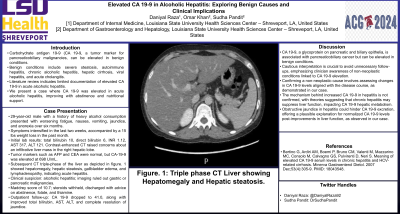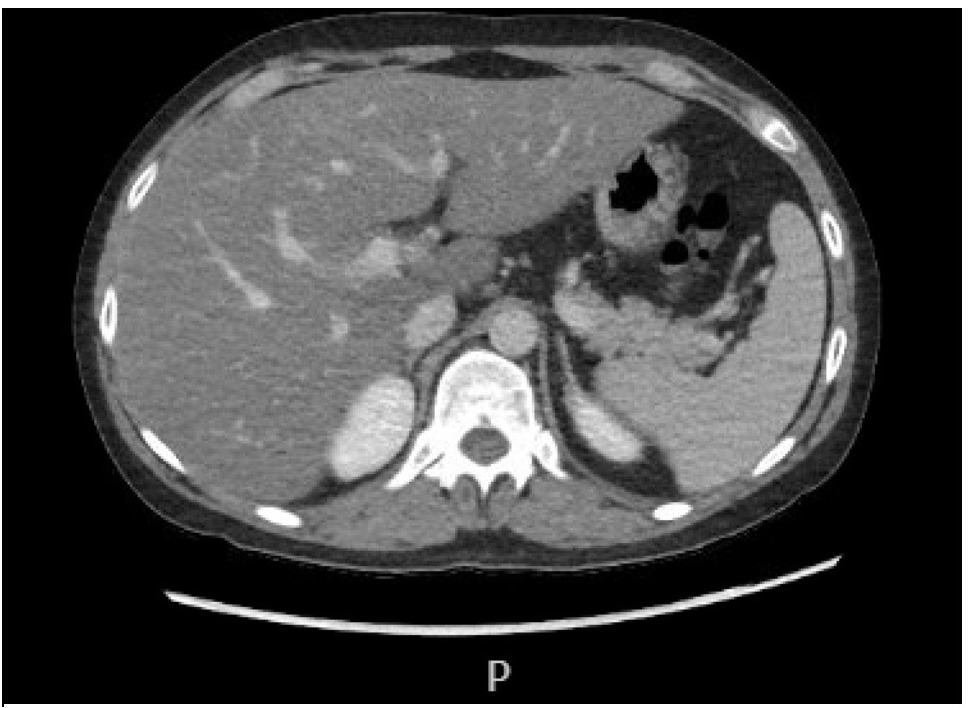Sunday Poster Session
Category: Liver
P1349 - Elevated CA 19-9 in Alcoholic Hepatitis: Exploring Benign Causes and Clinical Implications
Sunday, October 27, 2024
3:30 PM - 7:00 PM ET
Location: Exhibit Hall E

Has Audio

Daniyal Raza, MD
LSU Health
Shreveport, LA
Presenting Author(s)
Daniyal Raza, MD, Omar Khan, MD, Sudha Pandit, MD
LSU Health, Shreveport, LA
Introduction: Carbohydrate antigen 19-9 (CA 19-9), a tumor marker for pancreaticobiliary malignancies, can also be elevated in benign conditions such as severe steatosis, autoimmune hepatitis, chronic alcoholic hepatitis, hepatic cirrhosis, viral hepatitis, and acute cholangitis. Elevated CA 19-9 has not been well-documented in acute alcoholic hepatitis. We present a case of elevated CA 19-9 in a patient with acute alcoholic hepatitis, which improved with abstinence and nutritional support.
Case Description/Methods: A 29-year-old male with a 10-year history of significant alcohol use was admitted with worsening fatigue, nausea, vomiting, jaundice, and anorexia for six months. He reported an unintentional weight loss of 15 lbs over four weeks. Physical examination revealed marked scleral icterus, jaundice, hepatomegaly, and mild right upper quadrant tenderness. Initial lab results showed total bilirubin of 10 mg/dL, direct bilirubin of 6 mg/dL, INR of 1.12, AST of 317 U/L, and ALT of 121 U/L. A CT scan raised concerns for an infiltrative liver mass in the right hepatic lobe. Tumor markers such as AFP and CEA were normal, but CA 19-9 was elevated at 698 U/mL. Subsequent scans showed hepatomegaly, hepatic steatosis, gallbladder edema, and lymphadenopathy, indicating acute hepatitis. Viral hepatitis panel and chronic liver disease serology were negative. Maddrey’s Discriminant Function score was 10.7. The patient was managed with supportive treatment, advised on abstinence, and discharged with folate, thiamine, and multivitamin supplementation. Outpatient follow-up showed a decrease in CA 19-9 to 41.0 U/mL, with improvement in total bilirubin, AST, ALT, and jaundice.
Discussion: CA 19-9, a glycoprotein on pancreatic and biliary epithelia, requires cautious interpretation due to potential elevations in benign conditions. Despite its common association with pancreaticobiliary cancer, clinicians must not overlook benign conditions linked to CA 19-9 elevation. Confirming a non-neoplastic cause involves assessing if changes in CA 19-9 levels align with the disease course, as seen in our case. Elevated CA 19-9 levels in acute and chronic hepatitis may result from inhibited liver function reducing CA 19-9 metabolism or obstructive jaundice impeding CA 19-9 excretion. These theories explain the normalization of CA 19-9 levels and transaminases in this case after removing the inciting factor of alcohol.

Disclosures:
Daniyal Raza, MD, Omar Khan, MD, Sudha Pandit, MD. P1349 - Elevated CA 19-9 in Alcoholic Hepatitis: Exploring Benign Causes and Clinical Implications, ACG 2024 Annual Scientific Meeting Abstracts. Philadelphia, PA: American College of Gastroenterology.
LSU Health, Shreveport, LA
Introduction: Carbohydrate antigen 19-9 (CA 19-9), a tumor marker for pancreaticobiliary malignancies, can also be elevated in benign conditions such as severe steatosis, autoimmune hepatitis, chronic alcoholic hepatitis, hepatic cirrhosis, viral hepatitis, and acute cholangitis. Elevated CA 19-9 has not been well-documented in acute alcoholic hepatitis. We present a case of elevated CA 19-9 in a patient with acute alcoholic hepatitis, which improved with abstinence and nutritional support.
Case Description/Methods: A 29-year-old male with a 10-year history of significant alcohol use was admitted with worsening fatigue, nausea, vomiting, jaundice, and anorexia for six months. He reported an unintentional weight loss of 15 lbs over four weeks. Physical examination revealed marked scleral icterus, jaundice, hepatomegaly, and mild right upper quadrant tenderness. Initial lab results showed total bilirubin of 10 mg/dL, direct bilirubin of 6 mg/dL, INR of 1.12, AST of 317 U/L, and ALT of 121 U/L. A CT scan raised concerns for an infiltrative liver mass in the right hepatic lobe. Tumor markers such as AFP and CEA were normal, but CA 19-9 was elevated at 698 U/mL. Subsequent scans showed hepatomegaly, hepatic steatosis, gallbladder edema, and lymphadenopathy, indicating acute hepatitis. Viral hepatitis panel and chronic liver disease serology were negative. Maddrey’s Discriminant Function score was 10.7. The patient was managed with supportive treatment, advised on abstinence, and discharged with folate, thiamine, and multivitamin supplementation. Outpatient follow-up showed a decrease in CA 19-9 to 41.0 U/mL, with improvement in total bilirubin, AST, ALT, and jaundice.
Discussion: CA 19-9, a glycoprotein on pancreatic and biliary epithelia, requires cautious interpretation due to potential elevations in benign conditions. Despite its common association with pancreaticobiliary cancer, clinicians must not overlook benign conditions linked to CA 19-9 elevation. Confirming a non-neoplastic cause involves assessing if changes in CA 19-9 levels align with the disease course, as seen in our case. Elevated CA 19-9 levels in acute and chronic hepatitis may result from inhibited liver function reducing CA 19-9 metabolism or obstructive jaundice impeding CA 19-9 excretion. These theories explain the normalization of CA 19-9 levels and transaminases in this case after removing the inciting factor of alcohol.

Figure: Figure. 1: Triple phase CT Liver showing Hepatomegaly and Hepatic steatosis
Disclosures:
Daniyal Raza indicated no relevant financial relationships.
Omar Khan indicated no relevant financial relationships.
Sudha Pandit indicated no relevant financial relationships.
Daniyal Raza, MD, Omar Khan, MD, Sudha Pandit, MD. P1349 - Elevated CA 19-9 in Alcoholic Hepatitis: Exploring Benign Causes and Clinical Implications, ACG 2024 Annual Scientific Meeting Abstracts. Philadelphia, PA: American College of Gastroenterology.
